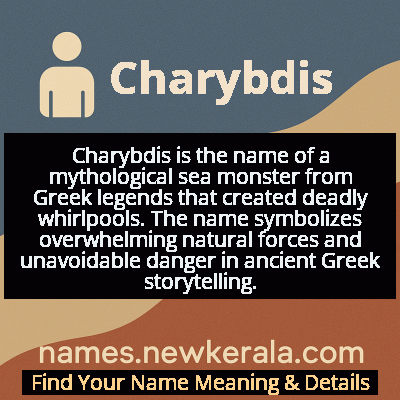Charybdis Name Meaning & Details
Origin, Popularity, Numerology Analysis & Name Meaning of Charybdis
Discover the origin, meaning, and cultural significance of the name CHARYBDIS. Delve into its historical roots and explore the lasting impact it has had on communities and traditions.
Name
Charybdis
Gender
Male
Origin
Greek
Lucky Number
8
Meaning of the Name - Charybdis
Charybdis is the name of a mythological sea monster from Greek legends that created deadly whirlpools. The name symbolizes overwhelming natural forces and unavoidable danger in ancient Greek storytelling.
Charybdis - Complete Numerology Analysis
Your Numerology Number
Based on Pythagorean Numerology System
Ruling Planet
Saturn
Positive Nature
Ambitious, efficient, realistic, and authoritative.
Negative Traits
Materialistic, stressed, confrontational, and can be overly ambitious.
Lucky Colours
Dark blue, black.
Lucky Days
Saturday.
Lucky Stones
Blue sapphire, amethyst.
Harmony Numbers
2, 4, 6.
Best Suited Professions
Business leaders, managers, financial services, law enforcement.
What People Like About You
Leadership, determination, organizational skills.
Famous People Named Charybdis
Charybdis of Myth
Mythological Figure
Created deadly whirlpools that threatened ancient sailors in the Strait of Messina
Charybdis Character
Literary Figure
Central obstacle in Odysseus's journey home in Homer's Odyssey
Charybdis Reference
Cultural Symbol
Became archetype for impossible choices and unavoidable dangers in Western thought
Name Variations & International Equivalents
Click on blue names to explore their detailed meanings. Gray names with will be available soon.
Cultural & Historical Significance
The cultural significance of Charybdis extends far beyond its original mythological context. The phrase 'between Scylla and Charybdis' has become proverbial in multiple languages, representing the dilemma of choosing between two equally dangerous alternatives. This concept has influenced Western philosophy, political theory, and everyday decision-making for millennia. The myth reflects ancient Greek attempts to understand and personify the terrifying forces of nature that Mediterranean sailors faced. In modern times, Charybdis continues to appear in literature, psychology, and political discourse as a metaphor for systemic dangers that cannot be avoided but only navigated with great skill and luck.
Extended Personality Analysis
As a mythological entity rather than a human character, Charybdis doesn't possess conventional personality traits but embodies specific archetypal characteristics. The name suggests someone with an overwhelming, consuming presence - individuals who draw others into their orbit with irresistible gravitational force. They may exhibit cyclical behavioral patterns, alternating between periods of intense activity and relative calm, mirroring the whirlpool's three-times-daily cycle of destruction. There's an element of profound depth and hidden currents in their emotional life, with powerful undercurrents that can surface unexpectedly.
People associated with this name archetype might be perceived as having an elemental, almost primal power that operates beyond conventional morality. They represent raw force rather than malicious intent - destroying not out of evil but simply by existing according to their nature. This creates an aura of both terror and fascination, making such individuals simultaneously feared and respected. The Charybdis personality type suggests someone who cannot be controlled or reasoned with, only navigated around or survived. They embody the concept of unavoidable circumstances and systemic forces that overwhelm individual will, representing situations where the only choice is which form of destruction to risk rather than whether to avoid danger entirely.
Modern Usage & Popularity
In contemporary usage, Charybdis remains exceptionally rare as a personal name due to its overwhelmingly negative mythological associations with destruction and unavoidable danger. The name appears primarily in academic, literary, and artistic contexts rather than in birth registries. It maintains cultural relevance through the enduring popularity of the 'between Scylla and Charybdis' idiom, which continues to be used in political commentary, business strategy, and personal decision-making discussions. In recent decades, the name has found niche usage in fantasy literature, video games, and role-playing games where mythological references are valued. Scientific communities, particularly in oceanography and fluid dynamics, occasionally use 'Charybdis' as a poetic reference to powerful vortex phenomena. Despite growing interest in mythological names, Charybdis's specific association with being consumed and destroyed makes it unlikely to gain popularity as a given name, though it remains potent as a cultural and symbolic reference.
Symbolic & Spiritual Meanings
Symbolically, Charybdis represents the concept of overwhelming, impersonal destruction and the inevitability of certain dangers in life. The whirlpool embodies cyclical patterns of crisis - the idea that some threats recur with predictable regularity yet remain impossible to avoid entirely. It symbolizes being consumed by circumstances beyond one's control, whether these be addiction, mental health struggles, economic crises, or systemic social forces. Unlike monsters representing evil intent, Charybdis symbolizes destruction that occurs without malice - a force that destroys simply by operating according to its nature. This makes it particularly potent as a metaphor for environmental disasters, market crashes, pandemics, or other large-scale phenomena that devastate without conscious intent. The symbolism extends to represent the destructive aspects of passion, obsession, or any force that draws a person in against their better judgment. Charybdis represents the understanding that some dangers cannot be eliminated, only navigated with wisdom and acceptance of necessary losses.

